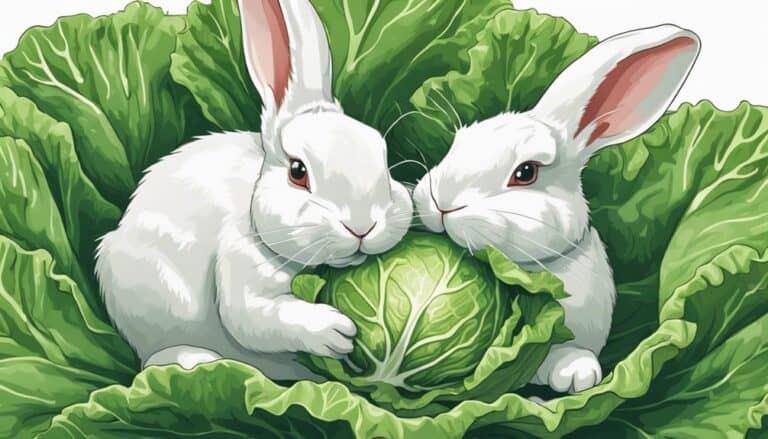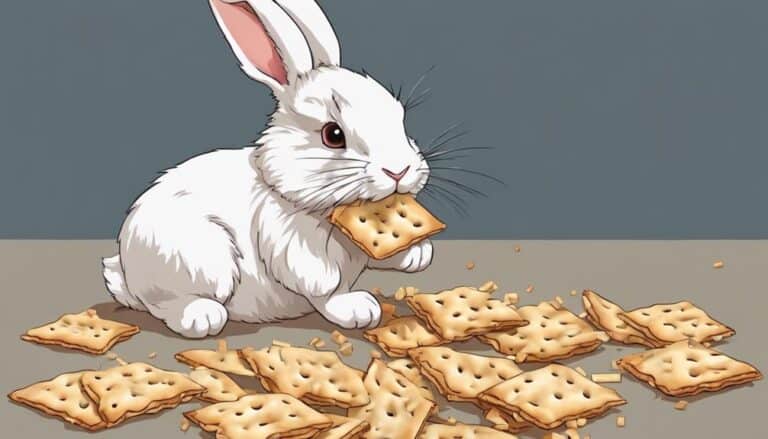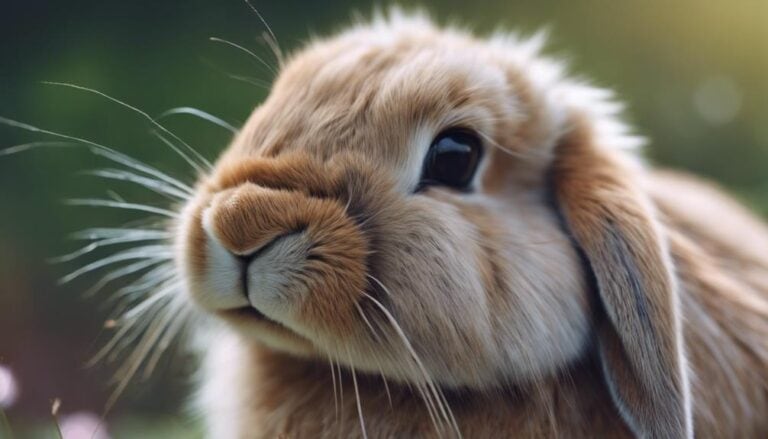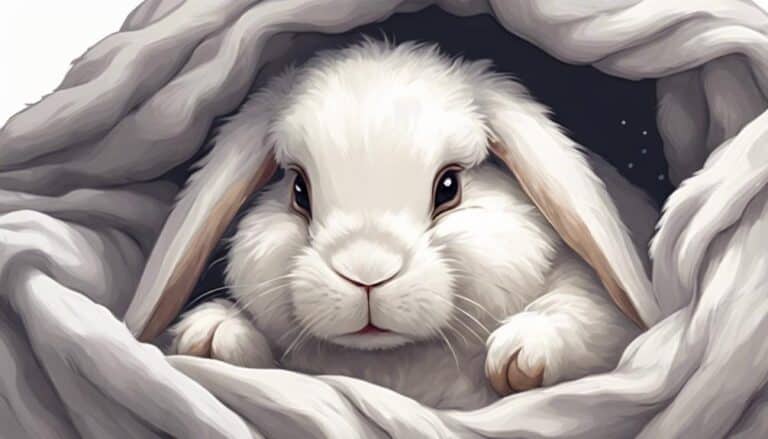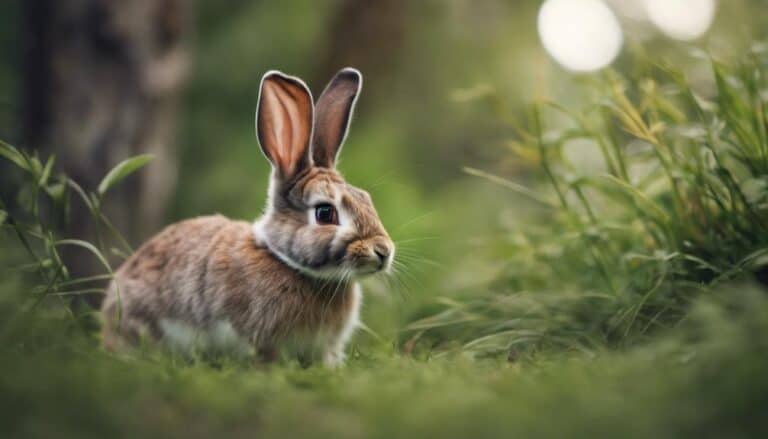If you've ever heard the saying 'everything in moderation,' it might make you wonder about your fluffy bunny's eating habits. But did you know that bunnies, like humans, can also run into trouble with overeating?
You might be surprised by how easy it is for your bunny to overindulge, and the consequences might not be what you'd expect. So, what should you be looking out for when it comes to your bunny's diet? Let's explore this further.
Contents
- 1 Key Takeaways
- 2 Rabbit's Natural Eating Behavior
- 3 Signs of Overeating in Rabbits
- 4 Causes of Rabbit Overeating
- 5 Impact of Overeating on Rabbit Health
- 6 Managing Rabbit's Diet to Prevent Overeating
- 7 Seeking Veterinary Advice for Overeating Issues
- 8 Can Drinking from a Bowl Lead to Bunnies Overeating?
- 9 Frequently Asked Questions
- 10 Conclusion
Key Takeaways
- Rabbits can overeat, leading to obesity and health issues.
- Proper hay intake prevents overeating of other foods.
- Overeating signals boredom, stress, or lack of hay.
- Veterinary guidance and monitoring prevent overeating risks.
Rabbit's Natural Eating Behavior
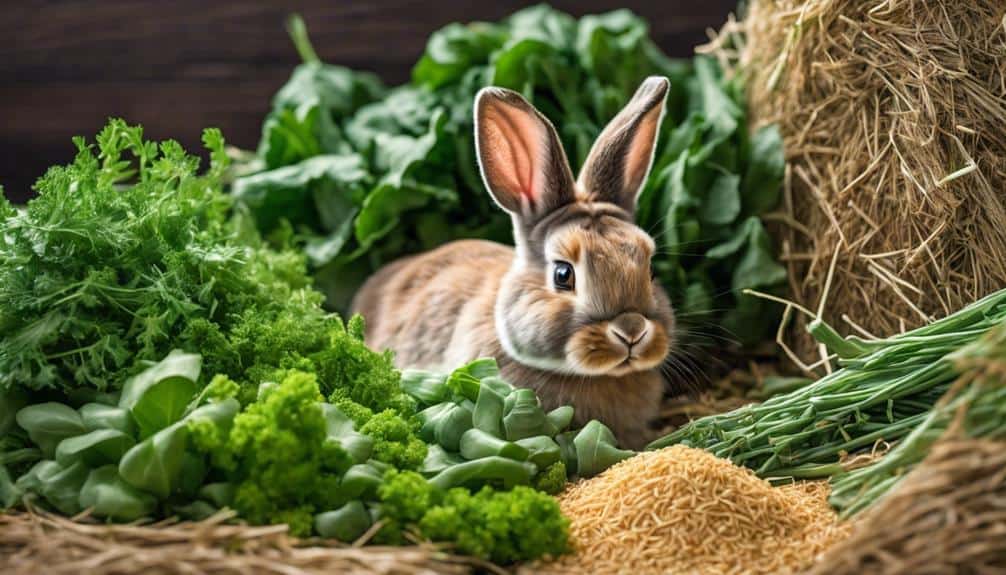
Rabbits exhibit a natural grazing behavior that's essential for their digestive health and overall well-being. Their digestive systems rely on a constant intake of fibrous materials like hay to function properly. Providing rabbits with unlimited access to hay is important as it promotes gut health and supports their digestive function effectively.
Despite this, rabbits may opt for pellets over hay if given the choice, which can lead to overeating and subsequent health issues. Overeating in rabbits commonly occurs when they consume easily consumable foods like pellets or treats, neglecting the necessary fibrous components in their diet, such as hay.
Ensuring that rabbits have a balanced diet that includes a sufficient amount of hay is crucial for maintaining their digestive system and overall health. By understanding and accommodating a rabbit's natural eating behavior, you can help prevent potential digestive problems and promote their well-being effectively.
Signs of Overeating in Rabbits
Shifting from discussing Rabbit's Natural Eating Behavior, it's important to recognize the signs of overeating in rabbits to guarantee their well-being and health. Overeating can lead to obesity, digestive issues like diarrhea, and behavioral changes such as aggression or lethargy in rabbits. Additionally, overgrown teeth can be an indication of overeating, which may further affect their health. To prevent overeating and make sure your rabbit stays healthy, it's critical to monitor their weight and food intake regularly.
To help prevent overeating in rabbits, consider the following strategies:
- Create a Feeding Schedule: Establishing a consistent feeding schedule can help regulate your rabbit's food intake and prevent overeating.
- Provide Fresh Vegetables: Incorporating a variety of fresh vegetables into your rabbit's diet not only adds nutritional value but also encourages slower eating habits.
- Use Feeding Toys: Utilizing feeding toys can help slow down your rabbit's eating pace, promoting better digestion and preventing overeating.
Causes of Rabbit Overeating
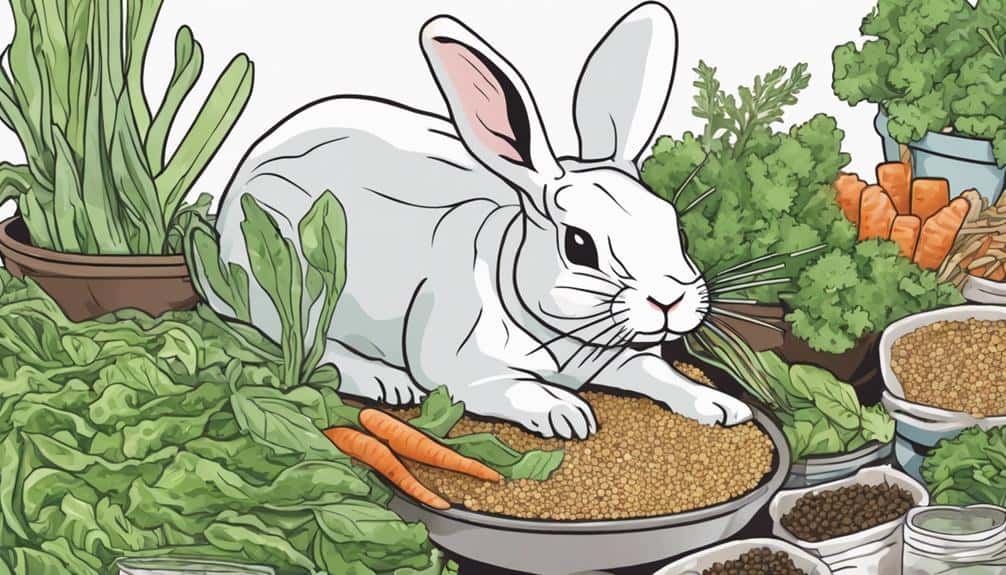
Rabbits may overeat due to various reasons such as eating too quickly, a lack of hay in their diet, or experiencing boredom or stress. Eating rapidly can lead to consuming more food than necessary, while a deficiency in hay can trigger overeating behaviors in rabbits.
Additionally, boredom or stress can cause rabbits to seek comfort in continuous eating, potentially leading to health issues if not addressed promptly.
Eating Too Fast
When consuming their meals hastily, rabbits may fail to recognize their fullness, potentially leading to overeating and subsequent health concerns. Eating too fast can disrupt the digestive system's ability to signal fullness, causing rabbits to overeat unknowingly. Here's why rapid eating can be problematic for rabbits:
- Impaired Chewing: Rapid eating hinders proper chewing of food, affecting digestion.
- Missed Satiety Signals: Quick consumption can prevent rabbits from receiving satiety signals, leading to excessive food intake.
- Digestive Issues: Overeating due to fast eating can result in digestive problems and potential health issues for rabbits.
Encouraging slower eating habits can aid in preventing overeating and promoting better digestive health for your rabbit.
Lack of Hay
Impaired Chewing due to rapid eating can lead to digestive issues in rabbits, highlighting the importance of ensuring a constant supply of hay in their diet to prevent overeating of other foods.
Hay scarcity can trigger rabbits to overeat pellets or treats when not provided with enough roughage.
Rabbits require constant access to hay, as it plays a critical role in their diet. When hay is lacking, rabbits may compensate by consuming excessive amounts of other food, leading to obesity and digestive problems.
A shortage of hay in a rabbit's diet often results in overeating, as they instinctually eat more to prepare for potential scarcity.
Ensuring the availability of hay is essential to prevent rabbits from indulging in unhealthy eating habits and to maintain their overall well-being.
Boredom or Stress
Excessive consumption in rabbits can often be linked to feelings of boredom or stress, prompting them to overeat as a means of coping with these emotional triggers. To address this issue effectively, consider the following:
- Provide Mental Stimulation: Offer toys and activities that encourage natural behaviors like foraging to prevent boredom-related overeating.
- Enhance Environmental Enrichment: Create a stimulating environment with hiding spots, tunnels, and different textures to keep rabbits engaged and mentally active.
- Increase Interaction: Spend quality time interacting with your rabbits through grooming, petting, or gentle play to alleviate stress and promote emotional well-being.
Impact of Overeating on Rabbit Health
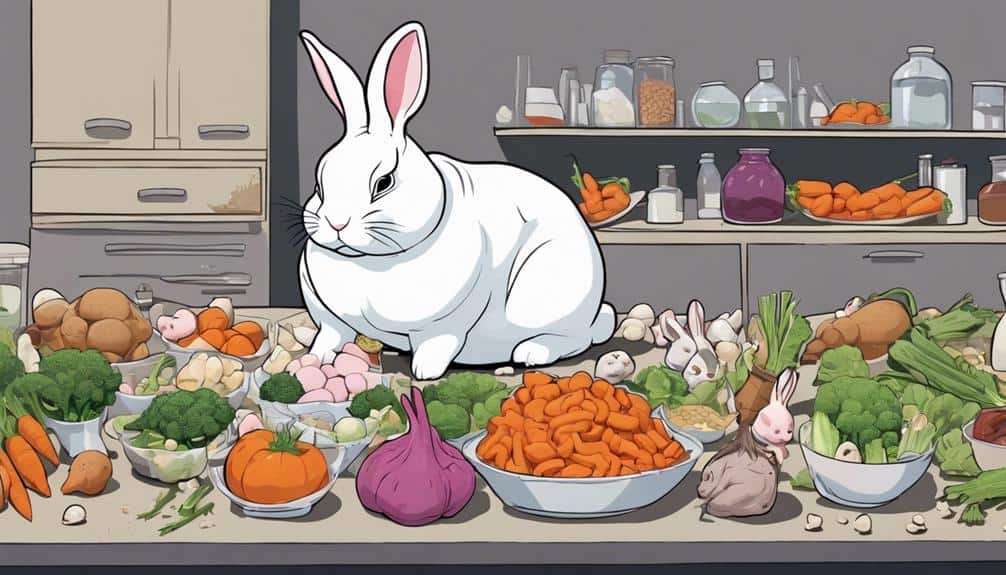
Overeating in rabbits can have detrimental effects on their health, potentially leading to obesity and various serious complications. Rabbits that overeat are at risk of developing digestive issues such as gut stasis, where the normal movement of food through the digestive system slows or stops, leading to discomfort and potential blockages.
Dental problems can also arise from overeating, as the continuous chewing required for a healthy diet may be disrupted. Behavioral changes, including lethargy or aggression, could indicate that a rabbit is overeating and struggling with the associated health issues.
Overgrown teeth may also be a consequence of overeating, requiring veterinary intervention to address. Preventing overeating through portion control and offering a balanced diet is critical in maintaining optimal health for rabbits. By monitoring their food intake and providing appropriate portions, you can help prevent the negative impacts of overeating and maintain the well-being of your furry companion.
Managing Rabbit's Diet to Prevent Overeating
To effectively manage your rabbit's diet and prevent overeating, focus on monitoring their hay intake as an important step in maintaining a healthy nutritional balance. Here are three key strategies to help prevent your rabbit from eating too much and developing weight gain and obesity:
- Provide a Balanced Diet: Make sure your rabbit's diet is low in calories and high in fiber by offering a variety of fresh hays. This will help keep them full and prevent overeating of low-nutrient, high-calorie foods.
- Limit Access to Treats: Avoid overfeeding high-sugar treats and pellets, as these can lead to weight gain and digestive complications. Instead, opt for small amounts of fresh vegetables as occasional treats.
- Monitor Hay Intake: Keep track of how much hay your rabbit consumes daily. Hay should make up the majority of their diet to promote a healthy digestive system and prevent overeating of other foods.
Seeking Veterinary Advice for Overeating Issues
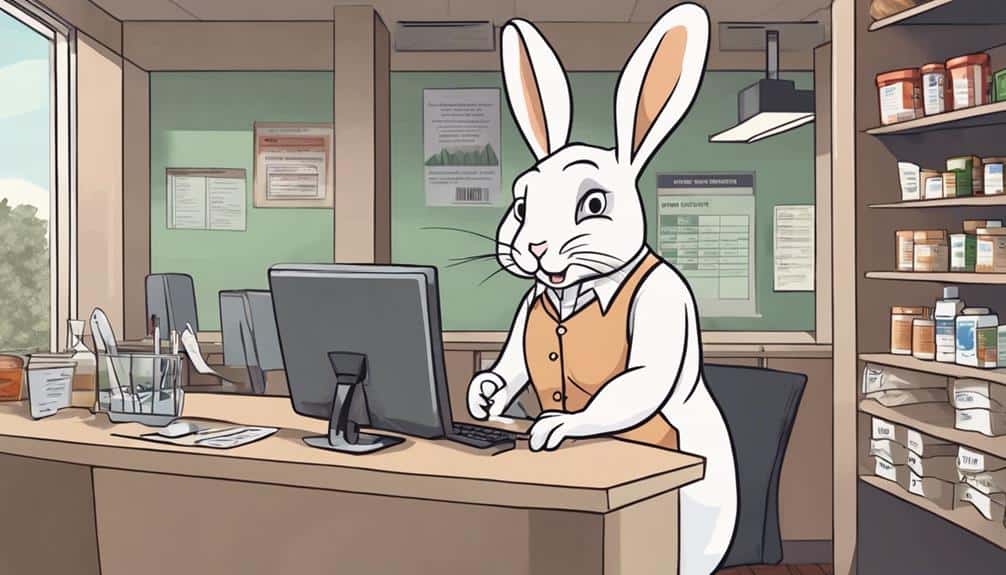
When addressing overeating issues in bunnies, consulting a veterinarian with expertise in rabbit care is essential for tailored guidance and solutions. A rabbit-savvy veterinarian can help determine the underlying causes of overeating in bunnies and provide specific recommendations for dietary adjustments and behavioral modifications to prevent overeating. Professional guidance from a veterinarian is critical in addressing any health risks associated with bunnies consuming excessive amounts of food. By seeking veterinary advice, you guarantee that your bunny receives the necessary support and personalized care to manage and prevent overeating problems effectively.
A veterinarian experienced in rabbit care will be able to evaluate your bunny's overall health, identify any triggers contributing to overeating behaviors, and create a thorough plan to address these issues. Remember, preventing overeating isn't only essential for maintaining a healthy weight in bunnies but also for promoting their overall well-being. Trusting a knowledgeable veterinarian for guidance on overeating problems in bunnies is key to ensuring a happy and healthy life for your furry friend.
Can Drinking from a Bowl Lead to Bunnies Overeating?
Drinking water for rabbits from a bowl can lead to overeating. Bunnies have a tendency to eat more when they are drinking directly from a bowl, as they may not pace themselves. It’s best to use a water bottle to regulate their intake and prevent overconsumption.
Frequently Asked Questions
Do Rabbits Stop Eating When Full?
When it comes to rabbits, they don't have a built-in stop button for eating. Without a natural "fullness" signal, it's up to you to manage their food intake, portion sizes, and nutritional balance to prevent overeating and maintain their health.
What Happens if You Overfeed a Rabbit?
Overfeeding a rabbit can lead to a cascade of health issues. Digestive problems, obesity risks, and weight gain are just the start. Your bunny may suffer stomach discomfort, limited mobility, and nutritional imbalances if overfed.
How Much Is Too Much Food for a Rabbit?
When considering how much food for a rabbit, remember dietary restrictions, portion control, feeding schedule, balanced diet, weight management, treat options, monitoring intake, hay consumption, fresh vegetables, and pellet recommendations. Follow these guidelines for prime health.
Can Rabbits Eat as Much as They Want?
You should not let rabbits eat as much as they want. Portion control, nutritional balance, and weight management are essential. Set dietary restrictions, limit treats, monitor intake, follow a feeding schedule, offer food variety, healthy snacks, and watch behavioral cues for a healthy bunny.
Conclusion
You now understand the importance of monitoring your bunny's diet to prevent overeating. Just like a well-tuned engine needs the right fuel to run smoothly, your rabbit needs a balanced diet to stay healthy.
Keep a close eye on their hay intake, limit pellets and treats, and watch for any changes in their eating habits. Remember, a healthy bunny is a happy bunny!

